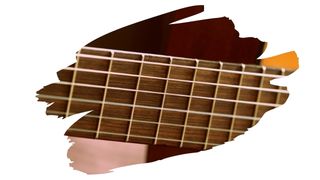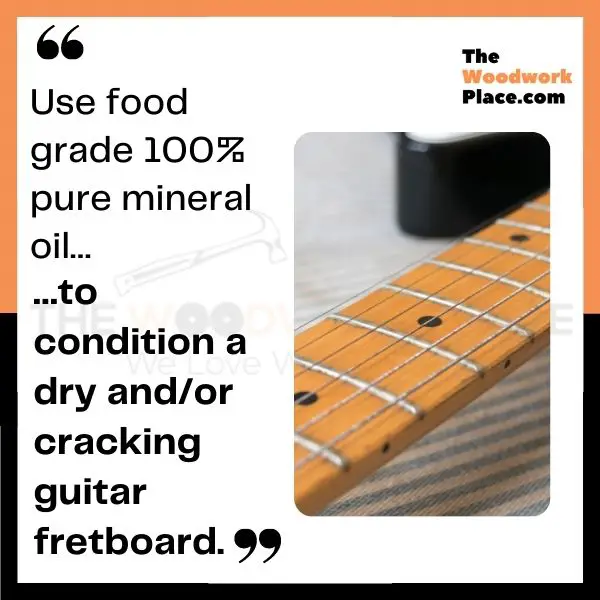Why should you oil your guitars unfinished fretboard?
To add life back to a fretboard that has begun to feel incredibly dry to the touch? To fix those worryingly fine cracks that have started to appear? To try and bring out the natural good looks of Rosewood?
Whatever your reasons, applying a conditioning oil treatment to your fretboard every 6 months or so, is a simple way to achieve all of the above.
But, while lemon oil fretboard products are all the rage, there is a citrus-alternative that is beginning to rise in popularity.
Orange oil fretboard products can enhance the look and feel of lumber just as well as any lemon specialty oil can.
Related Post: Deciding Between Lemon Oil Vs Tung Oil For Your Fretboard
But, is it really such a good idea to use orange oil to condition a guitar?
Well, in this post, you will learn why you should only use non-drying fretboard oils for conditioning your guitar. And we reveal what really goes into those pricey orange oil fretboard products…

This post may contain affiliate links to products that we receive a commission for (at no additional cost to you). Learn more here.
What Oil Should You Use On A Guitar Fretboard?
If your guitar fretboard is unfinished, (meaning it has been left without a sealing coat), then it can run the risk of cracking. This happens when the natural oils and moisture inside lumber completely dry out.
That is why your fretboard needs to be conditioned every 6-12 months. Conditioning involves rubbing a non-drying oil into that fretboard timber.
However, you must only ever use a non-drying oil to condition a fretboard. And, the best non-drying conditioning oil is pure food grade mineral oil.
What Is A Non-Drying Oil? A non-drying oil is basically an oil that does not dry. It will always stay greasy to the touch (unless it is washed off). As a result, these types of oils do not dry or cure. And, most importantly, they do not harden into a brittle film coat.

And What Is Mineral Oil Exactly?
Mineral oil is made from 100% natural petroleum.
Now, there are many different types of mineral oil products, such as Paraffin oil for example. Plus, most mineral oil products are pretty toxic.
However, food-grade mineral oil is not toxic, because this mineral oil version has been thoroughly filtered and refined.
Made from petroleum distillate, food grade mineral oil is widely used as a non-drying wood preserving oil. And you can buy it from most local stores and pharmacies.
Is Orange Oil A Mineral Oil? All mineral oil products are made from petroleum. However, pure orange oil is an essential oil that comes from the citrus rind of oranges. So, no, pure orange oil is not a mineral oil at all.
Can You End Up Over Oiling A Fretboard?
You can easily end up overdoing things when it comes to oiling fretboard wood. In fact, one of the big mistakes people make with fretboard oils, is over-application.
However, you only want to moisturize the fretboard. You do not want to drench it in oil, as though applying a wood finish (or dressing a salad!).
You see, you can actually use mineral oil as a wood finish too.
When used as a wood finish, you need to saturate timber with mineral oil so that it can make wood less water absorbent. This is why food grade mineral oil is also popularly used on cutting boards and butcher blocks.
Related Post: Walnut Oil Vs Mineral Oil: Which One’s Better For Your Cutting Board?
However, the aim of fretboard conditioning is to simply prevent wood from drying out and cracking… not to make it water resistant.
So, don’t oil the fretboard more than once or twice a year. And always stick to a ‘less is more’ light touch application of the stuff.
Is Orange Oil A Non-Drying Oil? Or Does Orange Oil Dry?
Orange oil is a citrus essential oil. In its pure form, it would be classed as a non-drying oil, as it does not cure and harden.
But, orange oil fretboard products are actually mostly made from food grade mineral oil. Only difference is, they happen to have a few drops of orange essential oil added to it. So, yes, orange fretboard oils are non-drying.
The same goes for lemon fretboard oils. Lemon fretboard oils are also just mineral oil with a touch of lemon thrown in.
Will Orange Oil Darken The Wood? No, citrus-smelling fretboard oil products won’t darken wood, because mineral oil doesn’t darken wood.

To Wrap Up, Here Are Your 3 Key Takeaways…
- 1). Use food grade 100% pure mineral oil to condition a dry and/or cracking guitar fretboard.
- 2). Orange oil fretboard products are made from a blend of food grade mineral oil and drops of orange essential oil.
- 3). And because mineral oil is a clear oil, it will not discolor or darken wooden surfaces.



